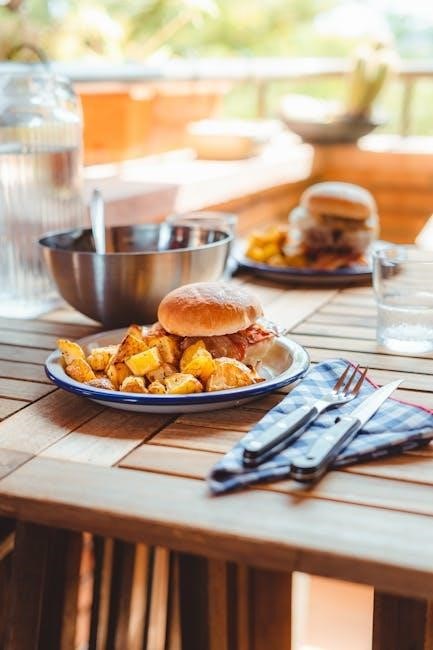A 5000-calorie meal plan is designed for individuals seeking rapid muscle growth or weight gain, typically athletes or those with high metabolisms. It provides a structured approach to consuming sufficient nutrients, ensuring balanced macronutrient intake while supporting energy needs and recovery. This plan is ideal for bulking phases, offering flexibility to accommodate different dietary preferences and lifestyles. It emphasizes whole foods, protein-rich options, and calorie-dense snacks to meet daily targets effectively.

Importance of a 5000-Calorie Meal Plan
A 5000-calorie meal plan is essential for individuals aiming to gain weight or muscle mass, particularly ectomorphs or those with high metabolisms. It ensures a calorie surplus, which is crucial for growth and recovery. By consuming 5000 calories daily, individuals can support intense training, replenish energy stores, and build lean tissue. This plan is tailored to meet the nutritional demands of athletes or bodybuilders in a bulking phase, providing a balanced mix of proteins, carbohydrates, and fats. It also helps avoid nutrient deficiencies by emphasizing whole, nutrient-dense foods. For those struggling to gain weight, a structured 5000-calorie meal plan offers a clear guide to achieving their goals. Additionally, it promotes consistency in eating habits, which is vital for sustainable progress. While it requires careful planning, a well-designed 5000-calorie meal plan can significantly enhance muscle growth and overall performance.
Key Considerations for Creating a 5000-Calorie Meal Plan
Creating a 5000-calorie meal plan requires careful attention to macronutrient balance, calorie density, and nutrient diversity. Protein intake should be prioritized to support muscle growth, aiming for 1.2-2.2 grams per kilogram of body weight. Carbohydrates and fats should also be balanced to provide sustained energy and hormonal support. Incorporating calorie-dense foods like nuts, oils, and whole grains is essential to meet the high daily target without excessive volume. Meal frequency and timing are critical, with 5-7 meals per day recommended to maintain metabolic activity and prevent digestive overload. Hydration is also vital, as high calorie intake can lead to dehydration if not properly managed. Additionally, consider individual preferences, such as vegetarian or dairy-free options, to ensure the plan is sustainable. Avoid relying on junk food, as it may lead to nutrient imbalances. Consulting a nutritionist can help tailor the plan to specific goals and health needs. Finally, track progress regularly to adjust calorie and macronutrient intake as needed.

Daily Meal Breakdown
A 5000-calorie meal plan includes 6 balanced meals: breakfast, mid-morning snack, lunch, afternoon snack, dinner, and evening snack. Each provides a mix of proteins, carbs, and fats for sustained energy and recovery, using calorie-dense foods to meet the target without excess volume.
Breakfast

Breakfast is a critical meal in a 5000-calorie plan, providing the energy and nutrients needed to start the day. A typical breakfast includes high-calorie, nutrient-dense foods like oatmeal, eggs, and whole grains. For example, a meal might consist of 2 cups of oatmeal (224 calories), 1 English muffin with peanut butter (128+190 calories), and a banana (105 calories), totaling around 607 calories. Adding a protein shake or a serving of scrambled eggs can further boost calories and protein intake. Incorporating healthy fats, such as avocado or nuts, and complex carbs ensures sustained energy. Breakfast should also include a source of fiber to maintain digestion and satiety throughout the morning. Options like whole-grain toast or Greek yogurt can enhance the meal’s nutritional profile. Staying hydrated with milk, juice, or a smoothie is also recommended. This balanced approach ensures a strong foundation for meeting daily calorie goals while supporting muscle growth and recovery.
Mid-Morning Snack
The mid-morning snack is essential for maintaining energy levels and supporting muscle growth. A typical snack in a 5000-calorie plan should be calorie-dense and nutrient-rich. Options like low-fat yogurt (243 calories), granola (150 calories), and a banana (105 calories) provide a balanced mix of carbs, protein, and fats. Adding a protein bar (250-300 calories) or a handful of mixed nuts (170 calories) can further boost calorie intake. Incorporating a smoothie with protein powder, milk, and fruits is another excellent choice, offering approximately 400-500 calories. The goal is to ensure this snack contributes significantly to the daily calorie target while maintaining nutritional balance. Staying hydrated with beverages like Gatorade or fruit juice can also support energy levels. This snack should be consumed 2-3 hours after breakfast to keep metabolism active and prevent hunger before lunch. By combining high-calorie foods with nutrient-dense options, the mid-morning snack plays a crucial role in achieving the overall dietary goals.
Lunch
Lunch is a critical meal in a 5000-calorie plan, providing sustained energy and supporting muscle recovery. A typical lunch includes grilled chicken breast (6 oz, 260 calories, 50g protein), mixed vegetables (1 cup, 50 calories), and white rice (1.5 cups, 225 calories). Adding bread sticks (2 pieces, 120 calories) and a pat of butter (50 calories) increases the calorie intake. This meal totals approximately 928 calories, with a balanced mix of protein, carbs, and fats. For variation, quinoa or sweet potatoes can replace rice for added nutrients. Including avocado slices (100 calories) or a side salad with dressing (150 calories) further enhances the meal. Hydration is key, so pairing lunch with fruit juice (150 calories) or Gatorade (200 calories) is recommended. This meal not only satisfies hunger but also fuels the body for afternoon activities and training sessions. Proper portion sizes and calorie-dense foods ensure lunch contributes significantly to the daily 5000-calorie goal.
Afternoon Snack
The afternoon snack is a vital component of a 5000-calorie meal plan, helping to maintain energy levels and support muscle recovery. A recommended option is a high-calorie protein smoothie made with whey protein powder, whole milk, peanut butter, and banana, totaling around 600 calories. Alternatively, a combination of trail mix (1 cup, 700 calories) with nuts, seeds, and dried fruit, paired with a protein bar (400 calories), provides a quick and convenient snack. For those preferring savory options, cheese (1 cup, 300 calories) and whole-grain crackers (1 oz, 80 calories) are excellent choices. Adding a piece of fresh fruit (e.g., an apple, 95 calories) balances the snack with natural sugars and fiber. Staying hydrated is also important, so including a high-calorie drink like a mass gainer or fruit juice (200-300 calories) can enhance the snack’s effectiveness. This meal should be nutrient-dense, avoiding empty calories, to ensure it contributes meaningfully to the daily goal while supporting overall health and muscle growth.
Dinner
Dinner is a crucial meal in a 5000-calorie plan, providing substantial calories and nutrients to fuel recovery and growth. A recommended option is grilled chicken breast (6 oz, 360 calories, 60g protein), served with brown rice (2 cups cooked, 440 calories, 90g carbs) and steamed vegetables (1 cup, 50 calories, 10g carbs). Adding butter (2 tbsp, 140 calories) to the rice and vegetables enhances calorie intake. Alternatively, salmon (6 oz, 420 calories, 35g protein) paired with sweet potatoes (1 large, 250 calories, 50g carbs) and green beans (1 cup, 55 calories) is another balanced choice. Including a side salad with olive oil dressing (2 tbsp, 190 calories) adds healthy fats and fiber. To meet the calorie target, consider adding a mass gainer shake (400 calories) or a high-calorie smoothie (300-400 calories) after dinner. This meal should be rich in protein, complex carbs, and healthy fats to support muscle repair and energy replenishment, ensuring you stay on track to meet your daily macros and calorie goals. Proper hydration with water or a calorie-containing drink like fruit juice (150-200 calories) is also essential.
Evening Snack

The evening snack is a vital component of a 5000-calorie meal plan, helping to meet daily calorie goals and support overnight recovery. A recommended option is a protein shake (2 scoops, 400 calories, 40g protein) mixed with whole milk (1 cup, 150 calories). Pair this with a peanut butter and jelly sandwich (2 slices whole-grain bread, 2 tbsp peanut butter, 2 tbsp jelly, 450 calories, 20g protein, 60g carbs). For added calories, include a banana (1 medium, 100 calories, 25g carbs). This snack provides a balanced mix of protein, carbs, and fats to keep energy levels steady and support muscle growth. Alternatively, greek yogurt (1 cup, 200 calories, 20g protein) with granola (1/2 cup, 200 calories) and honey (2 tbsp, 140 calories) is another nutritious option. Timing this snack 1-2 hours before bed ensures your body has ample nutrients for recovery. This meal should be calorie-dense and easy to digest, helping you stay on track to meet your daily macronutrient and calorie requirements.

